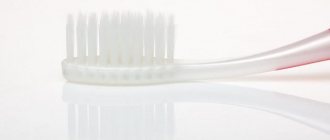How to remove bad breath? Effective, time-tested methods
- "Culprits" of bad breath
- What to do to eliminate unpleasant odor?
- Express methods
- Medicines
- Herbal breath fresheners
Bad breath is always an obstacle to communication with others. Therefore, the problem should be urgently eradicated so that it does not become the cause of psychological disorder and the appearance of complexes in a person. But first you need to find out what became the source of bad breath. Indeed, in most cases, halitosis indicates that serious disruptions are occurring in the body.
Bad breath: physiology or disease?
Bad breath
in medical language it is called
halitosis
. There are physiological and pathological halitosis. Bad breath often appears in the morning. During the night, bacteria and their metabolic products accumulate in the mouth, which causes a bad odor. This type of halitosis is physiological and can be eliminated by simply brushing your teeth. Physiological halitosis also includes odor caused by eating a number of foods, such as garlic, onions, cabbage. This smell will disappear on its own as soon as the substances that caused it are eliminated from the body. But it also happens that an unpleasant odor is not eliminated using hygiene procedures; in this case, most likely, it is of a pathological nature.
Does inflammation in the sinuses lead to bad breath?
Since the air is exhaled through the nasal cavity, it physiologically communicates with the paranasal sinuses; in the event of their purulent inflammation, an unpleasant odor is mixed with the inhaled portion of air. Sanitation of the oral cavity or treatment of stomach problems will not help in this case, since the source of the odor is outside the oral cavity.
Inflammation in the antrum of the maxillary sinus is caused by recurrent bacterial infections. Quite often, staphylococcus becomes such a “bad-smelling” agent.
Bad breath: causes
The most common cause of unpleasant odor is the active activity of pathological bacteria in the oral cavity. Diseases such as caries, periodontitis, pulpitis, periodontitis, gingivitis, stomatitis, as well as the formation of tartar can lead to persistent bad breath.
The second place among the causes of unpleasant odor is dry mouth (the medical term is xerostomia
). Mica, which moisturizes our mouth, has bactericidal properties. It kills bacteria, neutralizes their waste products, rinses and cleanses the oral cavity. If there is not enough saliva produced, bacteria are activated, resulting in an odor. Dry mouth can be a consequence of illness or taking a number of medications. It can also be caused by age: over time, the salivary glands begin to work less intensively, the composition of saliva changes, and its antibacterial properties are lost.
The smell can also be caused by ENT diseases: sore throat, chronic tonsillitis, sinusitis, runny nose.
Another cause of unpleasant odor is diseases of the internal organs. It can be:
- renal failure;
- liver failure;
- gastric diseases (gastritis, stomach ulcer);
- lung diseases.
Smoking is also a cause of persistent bad breath. The smell is caused by substances contained in tobacco smoke and deposited in the oral cavity. The only way to eliminate the unpleasant odor in this case is to quit smoking.
Features of treatment in this situation.
Brushing your teeth only eliminates the odor for a short time. With chronic inflammation of the paranasal sinuses, bad breath is usually not the only problem. Inflammation of the paranasal sinuses also causes other symptoms, such as pain in the affected sinus area and postnasal drip. Thus, for more effective help, the possibility of surgical treatment of inflamed paranasal sinuses should be considered, if conservative treatment methods are ineffective. If the inflammation is eliminated, bad breath usually goes away on its own.
The main goal in the surgical treatment of chronic sinusitis is to normalize the anatomy of the nasal cavity and restore the aerodynamics of the nasal cavity and paranasal sinuses. Corrective operations in the nasal cavity are performed: septoplasty, vasotomy with lateroposition, bullotomy cf. turbinates. The natural openings of the paranasal sinuses expand, allowing pus and mucus to leak out, and sinus ventilation is restored.
Restoring normal air exchange prevents the resumption of inflammation. In addition, as part of the operation, the affected sinus is washed out. The pus is removed, which usually eliminates the odor immediately. If secondary infection does not occur after surgery and healing proceeds normally, then the symptoms of halitosis disappear completely.
What is bad breath like?
Peculiarities of odor can indirectly indicate the source of problems.
Hydrogen sulfide smell
(the smell of rotten eggs) indicates rotting protein substances. This smell is typical for digestive problems. A persistent hydrogen sulfide odor may indicate gastritis with low acidity or a stomach ulcer.
Sourish smell
and a corresponding taste in the mouth is noted with gastritis with high acidity. This smell may appear at an early stage of the disease, when other symptoms are not yet present.
Bitter smell
and the taste in the mouth is typical of liver and gallbladder diseases. An additional symptom is the appearance of a yellow coating on the tongue.
Smell of acetone
and the accompanying sweet taste in the mouth is a characteristic symptom of diabetes.
Urine smell
from the mouth indicates a disease of the genitourinary system (primarily the kidneys or bladder).
Stool smell
from the mouth can occur due to intestinal diseases (dysbacteriosis, intestinal dyskinesia, intestinal obstruction).
Putrefactive
bad breath is typical for dental diseases (inflammatory processes of teeth and gums).
Which doctor should I contact?
In order to completely eliminate the problem, it is necessary to establish from what provoking factor it appears. To do this, the patient must visit a dentist and a gastroenterologist. Diagnostics in dentistry is carried out with a special device - a halimeter. Pathogenic bacteria are identified using a microbiological study of the composition of plaque on teeth. The dentist may prescribe blood tests and x-rays. Treatment of chewing organs and gum tissue involves complete sanitation of the oral cavity. Treatment of carious lesions and the fight against inflammatory processes are mandatory. A comprehensive approach to solving the problem may be required. Today, technologies are often used that provide oxygenation to the oral cavity. After all, oxygen inhibits anaerobic flora.
If after the procedures your breath smells like vinegar, you need to check your gastrointestinal tract. The doctor may prescribe endoscopy, ultrasound of the abdominal organs, and computed tomography. The treatment program may include drug therapy, physiotherapeutic procedures, a balanced diet, and immune support. Acidity neutralizers, histamine receptor blockers, antispasmodics and prokinetics, enzymes, enterosorbents, and probiotics are prescribed. It is important that the patient does not delay going to the doctor. Timely treatment prevents complications from occurring.
Bad breath: what to do?
The fight against bad breath begins with careful adherence to good oral hygiene. If the source of the odor is bacterial activity, proper brushing of your teeth will help. Teeth should be brushed not only from the outside, but also from the inside, and also treat the chewing surface of the teeth. The brush angle should be 45°. Using dental floss, hard-to-reach areas between teeth are treated. If your teeth are in poor condition, simply brushing your teeth will not solve the problem. You will need to visit a dentist and remove tartar, and if your teeth have caries, cure them. It is recommended to visit the dentist at least once or twice a year.
It is also necessary to combat dryness of the oral mucosa. If you feel dry mouth, take a few sips of water and rinse your mouth. However, it should be remembered that frequent dry mouth can be a symptom of serious diseases. However, like the unpleasant smell itself. Therefore, if you have persistent bad breath, you should definitely see a doctor and undergo an examination.
How can you tell if your breath smells?
Determining the freshness of your own breath is not at all easy. We adapt to the aromas that we smell all the time and stop noticing them. In addition, the oral cavity and nasopharynx are a single system, and this makes testing difficult. But there are several simple and visual ways to understand if there is a bad smell.
- Lick your wrist with the tip of your tongue and wait 15-20 seconds until the saliva dries. The scent left on the skin will give you some idea of the freshness of your breath. However, the tip of the tongue collects the smallest amount of bacteria, so the results will not be completely true.
- The main breeding ground for microflora that causes an unpleasant odor is located at the root of the tongue. Run your finger or a cotton swab in the area and smell: if the “sample” smells strong, there is a high chance that your breath may be spoiled too.
- Take a plastic cup, place it on your lips and release the air through your mouth. The smell inside the container will help determine if you are suffering from halitosis.
- Ask a loved one if he notices a specific “smell” when he communicates with you. Sometimes this is the most reliable way to find out the answer to a sensitive question.
Prevention
The best prevention of halitosis is following all the rules of hygiene: choosing the right brush and toothpaste, brushing your teeth and tongue twice a day, using floss and rinses, and regular visits to the dentist. In addition to these procedures, it is important to ensure that the diet is balanced and the intake of fluid into the body is sufficient.
Folk remedies
Traditional medicine can also cure halitosis. Moreover, in her arsenal there are no fewer tools than a dentist can offer. Thus, rinsing the mouth with water and adding a few drops of propolis tincture gives good results. For the same purpose, you can use an infusion of dried apricots, mint or strawberries.
It is quite effective to consume anise seeds daily on an empty stomach. And if you couldn’t find them, you can easily replace the anise seeds with two apples. The main thing is to rinse your mouth with warm water first.
After each meal, it is useful to eat half a teaspoon of grated ginger. But this recipe is not suitable for those patients who suffer from gastrointestinal diseases. In this case, it is better to simply chew or eat a couple of basil leaves. If bad breath is caused by sinusitis, traditional medicine recommends moistening cotton balls with celandine infusion and inserting them into the nostrils for 10 minutes. It will also be useful to replace store-bought rinses with decoctions of chamomile, sage or calendula.
Causes of halitosis
All factors contributing to the occurrence of halitosis are divided into 2 groups:
- Local
– related to the condition of the oral cavity; - General
– related to the health of internal organs and systems.
In most cases, the appearance of halitosis is due to dental reasons. Bad breath appears due to anaerobic bacteria living in dental plaque and tartar. These microorganisms release various volatile compounds (hydrogen sulfide, dimethyl sulfide, ammonia, trimethylamine, etc.) that affect the freshness of breath.
Dental causes of bad breath
To the main reasons
Local halitosis includes:
- poor oral hygiene, accumulation of bacterial plaque, formation of hard dental plaque;
- caries and its complications;
- stomatitis, periodontitis, periodontal disease;
- glossitis, gingivitis, cheilitis, pulpitis;
- alveolitis, peri-implantitis, pericoronaritis, etc.
Local halitosis may be accompanied by the following symptoms
:
- looseness, swelling, bleeding gums, formation of gum pockets;
- tooth mobility;
- white, yellow coating on the oral mucosa;
- an increase in the volume of gingival papillae between the teeth;
- pain, swelling of the oral mucosa.
Bad breath in an adult can occur when wearing braces or dentures. This happens if the structure is installed incorrectly, food debris accumulates under it, and insufficient care is provided.
Bad breath can occur in both adults and children. The causes of halitosis in children are the same as in adults. Therefore, treatment should begin with a visit to the dentist. Often, to eliminate bad breath from a child, it is enough to teach him how to brush his teeth correctly and cure caries.
Non-dental causes of halitosis
In practice, it often happens that to eliminate bad odor it is enough to just remove plaque and tartar. Dental deposits contain a large number of pathogenic microorganisms, which not only provoke bad breath, but also cause inflammation of the mucous membrane and periodontal tissue. However, sometimes a bad odor has a more complex cause.
Result of tartar cleaning
General halitosis is caused by the following reasons:
- diseases of the gastrointestinal tract (gastroesophageal reflux, ulcerative disease of the stomach and duodenum, gastric carcinoma);
- ENT pathologies (sinusitis, sinusitis, rhinitis, foreign body in the nasal passages);
- diseases of the respiratory system (bronchitis, pneumonia, bronchiectasis, etc.);
- systemic diseases (hepatitis, liver cirrhosis, renal failure, leukemia);
- endocrine disorders (metabolic syndrome, diabetes mellitus, endemic goiter).
Bad breath will not disappear if you mask it with aromatic flavors of chewing gum or dental rinses. Initially, it is necessary to identify and eliminate the root cause of the unpleasant manifestation.
Additional symptoms will help the doctor understand why your breath smells. If the dentist is sure that the problem that has arisen is not related to the health of the oral cavity, you should consult with a therapist. Based on the medical history and clinical manifestations, the therapist will refer you to a specialist - an otorhinolaryngologist, gastroenterologist, nephrologist, psychotherapist, endocrinologist, for an accurate diagnosis and effective treatment.
Symptoms and need for treatment
If the gums smell rotten, but there is no pain, a person often ignores this symptom for a long time, trying to hide the deficiency with chewing gum, lollipops, and toothpastes “for fresh breath.” However, if the problem is started, additional symptoms will arise that should not be ignored:
- swelling of soft tissues, the appearance of compactions or formations that are soft inside, and their contents gradually increase;
- fever without cold symptoms;
- sharp or aching pain radiating to the jaw and temple area;
- loss of appetite, insomnia, worsening mood;
- obvious facial asymmetry associated with edema;
- difficulties in chewing food, talking;
- loosening of teeth, exposure of roots.
It is important not to ignore these symptoms, but to consult a doctor immediately. The danger is that the smell of pus indicates infection of the areas. Fistulas can form on the mucous membranes, the rupture of which will lead to pus entering the body, which will cause serious damage to internal organs. Treatment of the problem at the initial stage will be as effective as possible, will allow you to avoid unnecessary expenses, and save teeth that can be damaged during purulent processes.
What can cause bad breath?
Xerostomia
Most often, an unpleasant odor occurs due to xerostomia - the death of tongue cells due to lack of saliva. Xerostomia is the main cause of bad breath in the morning. During the day, dead cells are washed away by saliva and the liquids we drink. At night, much less saliva is produced, the cells die in greater numbers and remain on the surface of the tongue. Bacteria actively eat them and produce those same bad-smelling compounds.
Eliminating halitosis caused by xerostomia is quite simple. Need to:
- Establish a drinking regime so that the body receives enough water;
- In the morning and evening, thoroughly brush not only your teeth, but also your tongue. For this, it is better to use a special brush, but a regular toothbrush will do just fine;
- Rinse your mouth with water several times throughout the day, especially after eating.
What happens if all this is not done: bacteria remain on the tongue, and since they have enough food - dead cells that also remain on the surface, they actively multiply. The more microflora in the mouth, the more hydrogen sulfide, ammonia and methyl mercaptan they produce, and the stronger the odor from the mouth.
Xerostomia can be caused by functional disorders of the salivary glands. Due to inflammation or other reasons, little saliva is produced and or it is too viscous to fully clean the mouth. In such a situation, you need to consult a doctor.
Geographic tongue (desquamative glossitis)
This is the name for a condition in which smooth pink spots appear on the tongue. Compared to healthy tissue, they look like bald spots. In this article we will not delve into the causes of this condition; there are quite a lot of them, and the pathology itself has not been fully studied.
With glossitis, the surface of the tongue becomes heterogeneous and a dense coating may form in the depressions (in the spot area). It is poorly washed off by saliva, so it becomes a favorable environment for the growth of bacteria.
How to eliminate bad breath in this case
It is quite difficult to combat halitosis in this situation. First of all, you need to find and eliminate the cause of glossitis. Regular rinsing with warm water or special rinses helps reduce the unpleasant odor.
Poor hygiene
Plaque constantly forms on the surface of the teeth. It consists of food debris, saliva, dead epithelial cells, as well as bacteria and their waste products. If a person brushes his teeth well 2 times a day and uses floss, this plaque is regularly removed. If hygiene is poor, part of the plaque remains on the teeth and hardens.
Hardened plaque is tartar that cannot be removed with a toothbrush. It is also an ideal “home” for bacteria. In the porous structure of the stone, food debris and other “delicacies” settle, which the microflora happily feeds on. And the more food bacteria have, the more smelly volatile compounds they release.
How to eliminate an unpleasant odor in this situation
Just starting to brush your teeth well is not enough; you won’t be able to remove tartar with a brush and floss. We do not recommend trying to do this with abrasive toothpaste or folk remedies. They are useless against tartar, but can damage tooth enamel.
You need to start with professional teeth cleaning. This procedure is performed only in a dental office using special equipment, instruments and tools. In many cases, this action alone is enough to get rid of bad breath. During cleaning, the doctor completely removes tartar, plaque, and with them the bacteria that live in them. There is no one else to release hydrogen sulfide with ammonia and your breath becomes fresher. How long the effect will last depends on how well the patient takes care of his teeth.
Diseases of teeth and gums
Heavy breathing almost always accompanies gingivitis, periodontitis and periodontal disease. An unpleasant odor in such diseases can be one of the first symptoms, along with bleeding gums.
Periodontal pockets, which form due to gum disease or poor brushing of teeth, can also cause bad breath. They accumulate food debris and dental plaque, that is, an ideal environment for bacteria is formed.
People with carious teeth often suffer from bad breath. The more units affected and the deeper the damage, the stronger the smell. Neither toothpaste nor rinses help get rid of it, since the source is inside the tooth. Interestingly, patients themselves rarely experience bad breath from caries.
What to do
Option one is to eliminate the cause. In such a situation, only treatment of bad breath at the dentist is effective, that is, treatment of caries.
Dentures, plates and braces
It is difficult to brush your teeth properly when there are foreign structures in your mouth. Residues of food can get under removable and bridge dentures and accumulate around the locks of the brace system. Bacteria, of course, will not miss the chance to have a feast in these areas and multiply their numbers several times. What happens next, you already know.
The only way to combat the smell in this case is good hygiene. It is especially important to carefully care for the oral cavity for those who wear removable dentures. The materials from which they are made absorb unpleasant odors and themselves become its source. In this case, the bad breath does not disappear after brushing your teeth, and you will have to change the denture.











